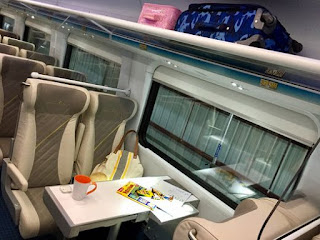WEST PALM BEACH — After years of failed attempts to bring higher-speed rail service to the Sunshine State, officials with Brightline relished a historic moment Wednesday, showing off the first train set delivered to their operations center in this South Florida city.
According to ustoday.com, the two locomotives and four passenger coaches, collectively dubbed "BrightBlue," arrived in West Palm Beach last month and were put on public display for the first time Wednesday. The set will soon be followed by four more - BrightOrange, BrightPink, BrightRed and BrightGreen - with the hopes of starting regular service by this summer.
 If
all goes according to plan, it will be the first privately run and
operated rail service launched in the United States in over 100 years.
And for passengers, it will mark the culmination of years of efforts to
create a higher-speed rail option between the tourist havens of Orlando
and Miami.
If
all goes according to plan, it will be the first privately run and
operated rail service launched in the United States in over 100 years.
And for passengers, it will mark the culmination of years of efforts to
create a higher-speed rail option between the tourist havens of Orlando
and Miami.Brightline president Mike Reininger said he expects about 3 million passengers a year in the first phase of operations, which will run between stations in West Palm Beach, Fort Lauderdale and Miami. By the time rail lines and stations are completed to Orlando, possibly by 2018, Reininger said they hope to lure up to 5.5 million passengers per year.
During a media tour Wednesday, officials from Brightline and Siemens, the California company that built the cars, showed off the new train set and the operations facility where they will be serviced.
The two locomotives feature 16-cylinder, 4,000 horsepower engines that will both be running when the train is moving. Russ Harvey of Siemens said local laws limit the train's speed to 79 mph throughout the heavily-populated South Florida region. Once it gets a bit farther north on its way to Orlando, it can kick it up to 125 mph. And, if it were allowed, Harvey said it could go even faster.
"It can go 125 mph not even at full throttle," Harvey said with a grin.
 The 32-inch wide aisles allow wheelchairs and strollers to easily
pass through. The seats - 19 inches wide in the standard "Smart"
coaches, 21 inches wide in the higher-end "Select" coach - are designed
to recline in a way that doesn't interfere with passengers seated
behind. All rows have power outlets, and tables include pop-up charging
stations with power outlets and USB connections.
The 32-inch wide aisles allow wheelchairs and strollers to easily
pass through. The seats - 19 inches wide in the standard "Smart"
coaches, 21 inches wide in the higher-end "Select" coach - are designed
to recline in a way that doesn't interfere with passengers seated
behind. All rows have power outlets, and tables include pop-up charging
stations with power outlets and USB connections. Each car has a
large storage area that holds bicycles and larger bags. And each
bathroom is designed to be completely hands-free, including doors,
faucets and toilets that all operate with the wave of a hand.
Each car has a
large storage area that holds bicycles and larger bags. And each
bathroom is designed to be completely hands-free, including doors,
faucets and toilets that all operate with the wave of a hand.Reininger said the Wi-Fi service on the train will be "continuous, powerful and free." And he said the trains will introduce a new concept - train stations built at the same level of the passenger coaches, meaning people won't have to climb up and down stairs to board.
The BrightBlue train set was pulled 3,000 miles from the Siemens factory in Sacramento, Calif., to the operations facility in West Palm Beach. That means the first test runs will start next week, with officials placing 40-pound bags of sand on each of the train's 240 seats to begin testing how it runs with passengers aboard.
After that, they expect to receive another train set per month, ending up with five sets that will begin operations this summer.






